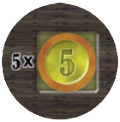
Difference between construction and buying
All buildings and ships may be either built (constructed) or bought as a player chooses; they are usually built. This difference is very important:
Building is always a Main action, and requires building resources. It is taken in a Construction building such as the Construction Firm or one of the Building Firms.
Buying is always an Additional action and requires money.
In both cases, the player who builds or buys the building takes the card and places it in front of her.
Only buildings in the Building Proposals can be built
The topmost buildings in the Building Proposals piles can either be bought or built. Buildings that belong to the town cannot be built but can only be bought (The buildings have already been constructed).
No Token limit
The supply of game tokens (goods and Francs) is unlimited. If the supply of one type of good runs out, there are 5x multipliers on the back of the "2 Food production" tokens. If a token is placed on one of these, it counts as 5 tokens.
Building Proposals emptied
If any of the three Building Proposals is emptied of cards, it remains empty for the rest of the game.
Change money, but no change for food or energy
In this game, players can exchange five 1 Franc coins for a 5 Franc coin (or vice versa) at any time, and can receive change if they pay more money than is required. A player who pays an entry fee with food or pays food during the Feeding phase does not receive change if he overpays. The same applies when a player pays too much energy for a building action; the excess energy is not returned.
Always round to the player's disadvantage
On many building cards, players may earn half goods or half Francs, or be required to pay half energy. Always round to the player's disadvantage: If a player should receive half of something, round down. If a player should pay half of something, round up.
Taking out a loan
A player may only take out one or more loans if she is unable to pay the interest on existing loans (see Supply action, page 4) or cannot pay the required food during the feeding phase.
The player then uses all of her food and money, and only if she still cannot pay the required amount can a new loan be taken out. A player taking a loan must take a Loan card and place it face-up on the table in front of her.
A player receives 4 Francs for each loan taken. Players are never obliged to sell buildings.
Repaying a loan
A loan may be repaid at any time during the game (even immediately before interest is paid). This costs 5 Francs. At the end of the game, players deduct 7 Francs for each outstanding loan in their possession.
Buidlings

Most of the buildings allow visitors to take an action. Others (for example, the Bank) do not allow actions and are only important for their owner. These cards have a padlock in the top row.
At the beginning of a game, only the Craftsman's buildings are important. The difference between the various types of buildings is relevant in the later game for the Town Hall and Bank (Standard buildings), as well as for the Guild House and Business Park (Special buildings). The value of these buildings is tied to the types of building that the player owns. The plus symbol is shown on all cards whose value is tied to other cards or to resources.
Note: Cards showing a Hammer or Fisherman symbol give bonuses to the owner of the Clay Mound, the Colliery, the Fishery and the Town Square (see Buildings overview).
A / between requirements means that either one or the other is required. Otherwise, use "and, optionally or": there are several building cards which allow several actions (e.g. the Marketplace and the Business Office).
An Arrow allows goods to be upgraded from one type to another. When taking the action, the upgrade may be carried out as many times as the player wishes, unless there is a restriction.
Restrictions are shown as a number above the arrow, showing how many times the Upgrade may be performed (e.g. "6x"). A condition is sometimes shown over the arrow, indicating that energy must be added either for each upgrade or for the entire upgrade at once (e.g. Bakehouse and Brickworks).

Continue Reading

